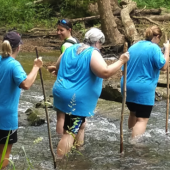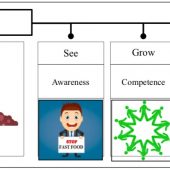
Abstract: The purpose of this article is to provide key aspects and learning outcomes associated with the Math of the Mountains Project. Math of the Mountains was a year long grant project that engaged 60 K12 mathematics teachers in the key concepts and applications of place-based learning and mathematics instruction. Through online coursework and peer support, a four-day immersive field experience, and teacher led field experiences, participants applied elements of PBL to create lesson activities that support real-world learning and problem solving scenarios.
Continue ReadingThis general issue of the Journal of Sustainability Education provides a wide range of articles related to student perspectives of sustainability as well as pedagogical frameworks for teaching it—with a focus on higher education. Four full articles explore various aspects of college and university students’ more-personal sustainability awareness, empowerment, and identity. In “Sulitest®: A Mixed-Method, Pilot Study […]
Continue Reading
Abstract: The impact of school gardening on nutritional attitudes and behavior regarding purchase and consumption of food is explored with pupils who participated in school gardens. The researchers of the recent study conceptualized a framework of potential factors influencing nutritional behavior based on empirical data with pupils from general and vocational high schools in Vienna. Three hundred and sixteen pupils, aged between 16 to 21, were interviewed in a cross-sectional study. The pupils who participated in school gardening are significantly better informed about sustainability than the pupils who did not. There is a significant difference between pupils who took part in school gardening and those who did not, regarding their self-assessment towards their connection to nature and sustainability. The total consumption of vegetables has increased within the families of participating pupils by 17%. School gardening seems to promote pupils’ reflection on their own diet as well as foster a favorable attitude towards a healthy and sustainable diet. We conclude that the implementation of school gardening has a significant positive impact on pupils’ attitude and behavior towards sustainable diets.
Continue Reading
Abstract: A United Nations international collaboration between the Education for Sustainable Development (ESD) and the Principles for Responsible Management Education (PRME) resulted in the creation of Sulitest® (aka Sustainability Literacy Test) an open, online training and assessment tool freely available to higher education institutions globally. This study analyzes the effectiveness of the newly developed Sulitest® to not only measure sustainability literacy of higher education student populations, but also act as a catalyst for boosting affective learning outcomes by: (a) generating interest in sustainability-related issues, (b) improving sustainability-related understandings, and (c) enhancing students’ interests in the subject matter. In order to do so we present a two-phase, exploratory mixed-method pilot study. Preliminary results from this pilot study reveal Sulitest is a useful tool for not only assessing sustainability literacy but also spurring student interests and motivations in sustainability-related subject matters. Findings, discussion and limitations are provided.
Continue ReadingAbstract: Environmental education scholars have argued for the need to focus on identity as a more predictive factor than attitude of individuals’ environmental behavior. We examine individuals’ decision-making as a mediating process between identity and behavior. University undergraduates (n=299) were surveyed, with a select sub-sample interviewed. As expected, environmental identity was correlated with pro-environment behavior (recycling). However, students with lower pro-environmental identity also recycled regularly. Similarly, analysis of decision-making revealed most students, regardless of their environmental identity, do not think much when recycling. Environmental structures such as presence of recycling bins surfaced as a powerful influence on pro-environment behavior.
Continue Reading